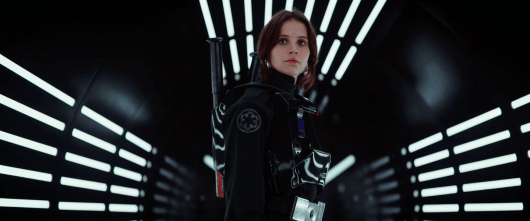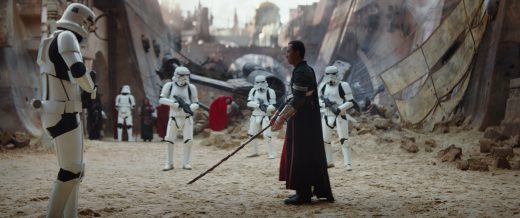
Iconic Hoth Battle set piece notwithstanding, the Star Wars saga has often given less thought to its title than one might expect. Gareth Edwards (director of 2014’s Godzilla) has arrived to remedy that with Rogue One, the latest installment in the ever expanding franchise and the first to find its way in between existing entries. It exists solely to answer the question of why, exactly, the almost omnipotent Galactic Empire left a blatant flaw in their doomsday weapon, the Death Star. If I were a cynic I’d call it a 135-minute exercise in brand massaging (and it is, in part, just that). However, aside from the way it nicely fills in some logical holes left by its successor (A New Hope), Rogue One stands as a much more important piece in the overarching Star Wars mythos.
And Gareth Edwards is the perfect director to place that piece. His eye for panoramic vistas and grandeur perfect for this universe. Rogue One is probably the most beautiful Star Wars film to date, CG-Grand Moff Tarkin notwithstanding. He foregrounds small characters, or even space ships, against impossibly majestic landscapes, the endless wide shots revealing his awe for this world he’s been allowed to play in. I should mention here that, despite the visual power of filmmaking in a digital age, Edwards and company find an aesthetic and atmosphere that truly cements itself as a prequel to A New Hope, relying on the clunkiness of physical effects (CG-Tarkin notwithstanding) that made the original feel so lived-in.
However, despite Rogue One’s visual grandeur, Edwards’ most important contribution to the saga is his knack for perspective. The brilliance of 2014’s Godzilla lies in the way it relegates its human protagonists to tertiary characters in its final act, setting the human ego (the part that champions our importance) aside and positioning its characters as truly insect-like against the gargantuan monster and its battle. Edwards brings this skill into the Star Wars universe, and the result is a film that captures the spirit of the Rebellion in a way that no previous installment has.
Star Wars has always been about destiny, hope, and family. Its grandiose themes matched by its almost fairy tale structure. Until now, however, only the exceptional individuals were given extended attention. Darth Vader, Luke Skywalker, and now Rey and Kylo Ren from last year’s Force Awakens were hardly cogs in the machine. With Rogue One Edwards manages to lend perspective to the cogs in the machine while still retaining the magical spirit of fate and destiny that made the original trilogy so iconic. And brilliantly stage titular star-war sequences.

The screenplay, particularly in the first hour or so, is notably stodgy. We jump from planet to planet as Edwards lays out the characters and sets the plot in motion (steal the Death Star plans). Indeed, Rogue One‘s chief flaw is its thinly written characters, drawn in the broadest of strokes but brought to life marvelously by a game cast (Donnie Yen as the Blind Jedi being the standout). Furthermore, despite its status as a standalone story, Rogue One feels surprisingly beholden to the structure of past entries (its climactic battle features intercutting between ground and aerial combat, much like the finale of Return of the Jedi). Thankfully, Edwards lends perspective to the battle in ways we haven’t seen before. Unnamed characters are given moments of import (whether triumphs or defeats) that place them within the annals of Star Wars history. An X-Wing pilot responsible for breaking down an enemy shield is downed by a TIE-Fighter, and Edwards cuts to the beach assault just as we see the pilot’s ship crash into the forest.
Despite Jyn Erso’s status as the protagonist, Edwards places the emphasis not on the individual, but the whole in a way no Star Wars film has done before. He moves us from the macro to the micro with grace and precision, placing the smallest of acts, the most seemingly insignificant sacrifices, in the context of the larger struggle against the Empire. And therein lies the brilliance of Rogue One – heroes like Luke Skywalker are born out of the sacrifices of the many, and even the smallest character’s decision to sacrifice for what is right is what makes these iconic heroes even possible. In Rogue One the Force is with everyone, each small sacrifice given screen time by Edwards. Rebellions are built on hope, and the denouement (also the beginning of A New Hope) stands as a reminder the “hope” is a team effort.

Great review! Like you touched on, I loved how this was a true team effort and no one member of Rogue One stood out as the “chosen one” who was destined to single-handedly save the galaxy. Just a group of flawed people who loved freedom and sacrificed everything to defeat the Empire.
LikeLiked by 1 person
Yes, exactly! It’s far from perfect, and maybe my review is a bit too glowing, but I loved that element about it SO much it didn’t matter.
LikeLiked by 1 person